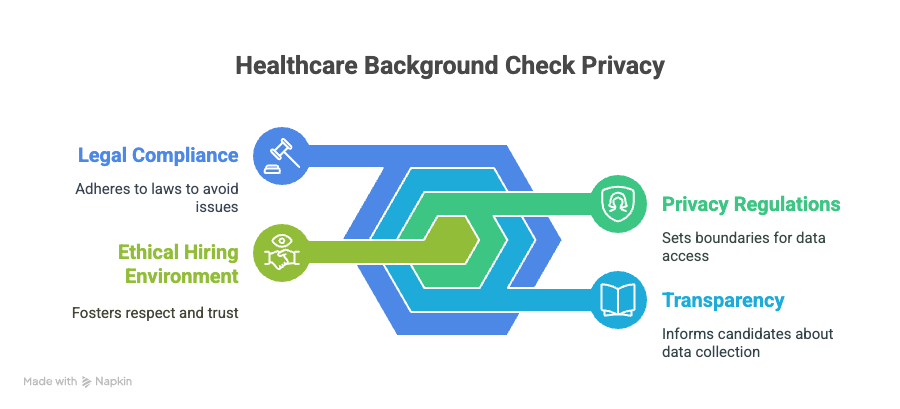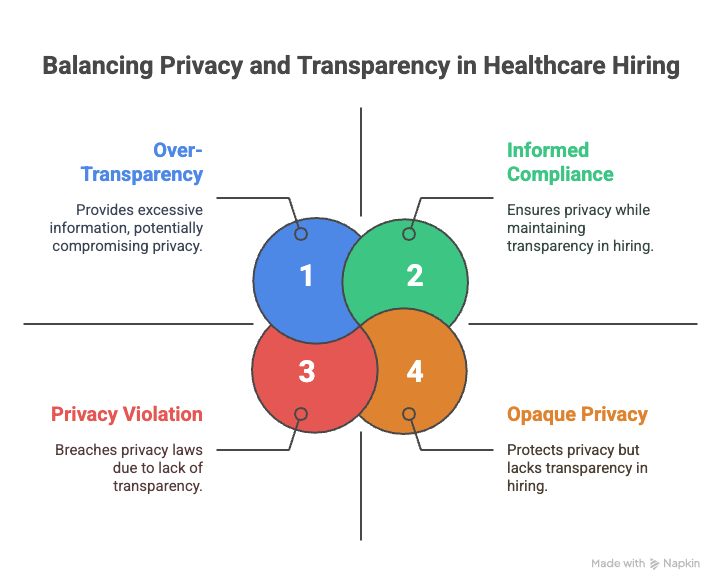In the rapidly evolving landscape of healthcare hiring, understanding privacy laws has never been more crucial. As we navigate the complexities of the year 2025, the integration of advanced technologies and stringent regulatory frameworks have reshaped how healthcare background checks are conducted. This guide explores the intersection of privacy laws and healthcare screening, with a focus on maintaining compliance and respecting individual rights.
Key Takeaways
- Privacy laws in healthcare hiring ensure the protection of personal data, fostering trust between employers and potential hires.
- Regulations like HIPAA impose strict guidelines on accessing and using medical information during background checks, impacting how employers screen candidates.
- Recent regulatory changes demand that healthcare employers use secure platforms and obtain clear, informed consent from candidates, while also being aware of varying state laws.
- Healthcare professionals need to be transparent with their information, while being aware of their rights regarding data protection and background checks.
- Staying informed on privacy laws helps both employers and potential hires navigate the healthcare hiring process ethically and legally.
In healthcare recruitment, I have learned that the laws of privacy are more than cosmetic legal protections, but rather vital trust builders. Every time we carry out a check, we are privileged with a person's history at perhaps one of the weakest points in the development of that person's career life cycle. I have learned that if we are respectful and transparent about handling information about individuals, we are more than meeting a statutory deadline, but showing respect. It is crucial that we as HR professionals lead from empathy, safeguard with purpose, and stay up-to-date, so that we may respect our patients as much as our employees. At the end of the day, trust is the foundation upon which all successful recruitment is achieved.
Introduction
As someone who has spent two decades immersed in the field of employment background checks, I've seen firsthand how privacy laws carve their path in shaping hiring processes. In healthcare, these laws carry even more weight. Patients count on personal privacy, and that expectation ripples into hiring practices. Over time, these regulations have grown tighter, with each rule aiming to protect sensitive information.
Privacy laws in healthcare hiring aren't just about red tape. They build a foundation of trust. Both employers and job candidates must juggle compliance while navigating these rules. For employers, the challenge lies in maintaining a reliable screening process within the bounds of privacy laws. For candidates, understanding these laws affects how they share personal information.
This article lays out the connections between privacy laws and healthcare screening today. We'll explore how these laws influence background checks and what implications arise for both healthcare employers and potential hires. Dive in with me to uncover how privacy laws not only protect but also shape the healthcare hiring landscape in 2025.
Understanding Healthcare Background Check Privacy Laws
Healthcare background check privacy laws are rules that dictate how personal information about job candidates is collected, handled, and protected during hiring. These laws are vital because they ensure that personal data is not misused, maintaining trust between employers and potential hires.

Privacy laws in the healthcare sector set boundaries around what information can be accessed. For instance, you cannot request details about a candidate's health history without their explicit consent. This protects sensitive data and minimizes the risk of discrimination based on health status.
In practice, these laws impact how you conduct screenings. You'll need to be transparent with candidates about what data you collect and why. Informing candidates upfront not only complies with legal requirements but also demonstrates respect for their privacy.
Consider the following: when was the last time you reviewed your company's privacy procedures? Keeping updated with current laws and adapting your practices can prevent legal issues down the line.
Privacy regulations are not just about complianceâÂÂtheyâÂÂre about fostering an ethical hiring environment that values individual rights. In your hiring process, remember that these laws are in place to protect everyone involved. How do you ensure that new procedures align with these principles?
Key Privacy Regulations Impacting Healthcare Screening
Privacy regulations play a crucial role in healthcare background checks. Understanding these regulations helps you navigate the hiring process while ensuring compliance. Here, you'll find a breakdown of key regulations that impact healthcare screenings in 2025.
HIPAA and Background Checks
HIPAA, or the Health Insurance Portability and Accountability Act, has been a cornerstone in the protection of healthcare information. When conducting background checks, HIPAA ensures that personal health information remains confidential during the hiring process. For instance, if you're handling a candidate's past medical records, HIPAA imposes strict guidelines on how this data can be accessed and shared. Remember, while transparency about a candidate's qualifications is necessary, it must not infringe upon their privacy rights.
Healthcare Hiring Compliance
Recent changes have tightened regulations to align with new technologies and privacy concerns. As an employer, you need to be aware of these shifts. For example, you should ensure that any online platforms used for screening comply with the latest data protection standards. Develop a checklist that includes verifying encryption methods and privacy settings of these platforms. Staying up-to-date with these compliance standards not only protects candidates but also shields your organization from potential penalties.
Data Privacy in Medical Employment
Handling sensitive information requires careful attention. Any data collected during screenings, like social security numbers or medical histories, must be stored securely. Utilize encryption and access controls to safeguard this data. Many organizations have invested in software that anonymizes sensitive information to further protect it. Look at successful cases where hospitals have implemented such measures to enhance data privacy during hiring.
Consent in Healthcare Screening
Informed consent remains a pivotal aspect of legal compliance. Before initiating any background checks, ensure you have clear, documented consent from the candidate. This means explaining what information will be gathered, how it will be used, and who will access it. Develop a straightforward, written consent form that candidates can review and sign, confirming their understanding and agreement.
State Privacy Laws
While federal laws set the baseline, state privacy laws add another layer of complexity. If your organization operates in multiple states, it's crucial to be aware of these differences. For instance, one state might have stricter laws regarding the disclosure of criminal histories than another. Create a matrix that maps out the specific requirements of each state you're hiring in, so you can adjust your procedures accordingly. Anticipating changes in state regulations will help you maintain compliance and avoid legal pitfalls.
Implications for Healthcare Professionals
Privacy laws play a crucial role in shaping the experience of healthcare professionals during the hiring process. Understanding your rights and responsibilities can make a significant difference in how you navigate this landscape.
First, know your rights. Privacy laws protect personal information during background checks. HIPAA, for instance, ensures that your medical history remains confidential and isn't accessed or shared without your explicit permission. This means employers can't simply dig into your health records during the hiring process.
Your responsibilities are also clear-cut. It's important to provide accurate information to potential employers. Dishonesty can lead to complications, as falsifying information can have serious repercussions, including job offers being rescinded. Transparency about your work history, credentials, and any relevant background information is crucial.
Privacy regulations can indeed impact job prospects. These laws require a consent-based approach, which might slow down the hiring process. However, they also ensure that you're assessed fairly and your personal information is used strictly within legal boundaries. Employers must strike a balance between respecting your privacy and ensuring you're the right fit for their needs.

Navigating privacy laws can be tricky, but being informed about your rights and responsibilities ensures you're not only compliant but also protecting your professional interests. As privacy laws continue to evolve, staying updated will be key to positioning yourself successfully in the healthcare job market.
Conclusion
Privacy laws significantly impact healthcare screening practices. These regulations ensure that personal information is protected while maintaining transparency in the hiring process. Employers must stay informed and adaptable as privacy laws continue to evolve. This awareness helps in fostering a hiring process that is both ethical and compliant. As the landscape of privacy regulations shifts, staying prepared will be key to navigating future challenges and opportunities in healthcare employment.
When diving into the world of employment background checks, it is crucial to arm yourself with the right resources. This step not only protects the company, but also instills trust, accountability, and empathy in all recruitment decisions that are made.
Resources
The guide titled "Understanding the Employment Background Check Process" offers a clear breakdown of how background checks work, what employers typically look for, and how the process affects both candidates and hiring managers. It's an essential primer for anyone involved in hiring or job-seeking.
Another vital read is "Background Checks: What Employers Need to Know" from the Equal Employment Opportunity Commission. This resource outlines employer obligations, privacy considerations, and compliance with federal laws, ensuring you're informed on protecting applicant rights while conducting thorough screenings.
Use these resources to enhance your understanding and ensure your practices align with both legal and ethical standards in healthcare hiring. Staying informed is the key to navigating the complexities of employment screening in an era that values both transparency and privacy.
Frequently Asked Questions (FAQs)
Are healthcare background checks covered by HIPAA?
HIPAA primarily protects patient health information. It does not typically apply to employment-related background checks unless these checks involve accessing an individual's confidential health information.
What privacy laws affect hospital employee screening in 2025?
As of 2025, privacy laws such as the Health Insurance Portability and Accountability Act (HIPAA), the Fair Credit Reporting Act (FCRA), and various state-specific laws impact hospital employee screenings. States like California and New York often have stricter regulations.
How do I get proper consent for healthcare background checks?
Obtain written authorization from the individual before conducting a background check. Clearly explain what the check will cover and how the information will be used.
Can employers screen medical workers for criminal records under privacy laws?
Yes, employers can screen medical workers for criminal records, but they must comply with FCRA regulations, including obtaining consent and notifying individuals of their rights.
What are the new state-level privacy laws that impact screening?
States like California have enacted laws such as the California Consumer Privacy Act (CCPA) that affect how personal information is collected and used during screenings. Keep updated on state-specific legislation to ensure compliance.
How often should healthcare employers perform background checks?
It is advisable to conduct background checks during the hiring process and periodically throughout employment to ensure compliance and safety in healthcare settings.
Are there restrictions on what can be included in a healthcare background check?
Yes, restrictions exist. Under FCRA, non-conviction information older than seven years can't generally be reported. States may have additional limitations on the disclosure of certain types of records.
What role does the FCRA play in healthcare background checks?
The FCRA regulates how employers obtain and use consumer reports for employment purposes. Employers must follow procedures for disclosure, consent, and adverse actions.
How can I ensure my background check process is compliant with both federal and state laws?
Stay informed about relevant laws and regulations, implement policies that reflect these rules, and regularly review your processes. Consulting with legal counsel familiar with employment and privacy laws can also aid compliance.
Is there any training available for employers on conducting compliant background checks?
Yes, many organizations offer training programs on conducting background checks in compliance with privacy laws. Consider workshops, online courses, or sessions provided by legal or human resources professionals.
Definitions
Background Check
A background check is the process employers use to verify a candidateâÂÂs personal, professional, or criminal history before making a hiring decision. In healthcare, this often includes checking licenses, employment history, education, and any past criminal offenses. It helps confirm the candidateâÂÂs qualifications and ensures patient and workplace safety.
Informed Consent
Informed consent means an applicant must clearly agree to a background check, understanding what information will be collected, how it will be used, and who will access it. Consent must be documented, voluntary, and revocable. You should provide this before screening begins, typically through a written or digital form.
Data Privacy
Data privacy refers to protecting personal information collected during the hiring process, such as medical details, social security numbers, or background reports. In healthcare, this involves putting safeguards in place to avoid unauthorized access or sharing. Think about who can view this data and how itâÂÂs stored securely.
HIPAA (Health Insurance Portability and Accountability Act)
HIPAA is a federal law that limits how healthcare organizations handle individualsâ medical information. During hiring, it restricts the access and use of personal health data unless itâÂÂs directly related to the job and has proper consent. You need to make sure screening procedures align with HIPAA rules to avoid legal violations.
Healthcare Hiring Compliance
Healthcare hiring compliance ensures that your recruitment practices follow all relevant laws and regulations, from background checks to privacy rules. This includes staying updated on federal and state laws, using secure technology, and training staff. Ask yourself: Are your current practices aligned with legal requirements in all states where you hire?
References
- Gcheck, âÂÂProtecting Background Data Under HIPAA & BeyondâÂÂ: https://gcheck.com/blog/protecting-background-data-under-hipaa-beyond/[5]
- The HIPAA Journal, âÂÂBackground Checks for Healthcare EmployeesâÂÂ: https://www.hipaajournal.com/background-checks-for-healthcare-employees/[4]

GCheck Editorial Team
Meet the GCheck Editorial Team, your trusted source for insightful and up-to-date information in the world of employment background checks. Committed to delivering the latest trends, best practices, and industry insights, our team is dedicated to keeping you informed.
With a passion for ensuring accuracy, compliance, and efficiency in background screening, we are your go-to experts in the field. Stay tuned for our comprehensive articles, guides, and analysis, designed to empower businesses and individuals with the knowledge they need to make informed decisions.
At GCheck, we're here to guide you through the complexities of background checks, every step of the way.






